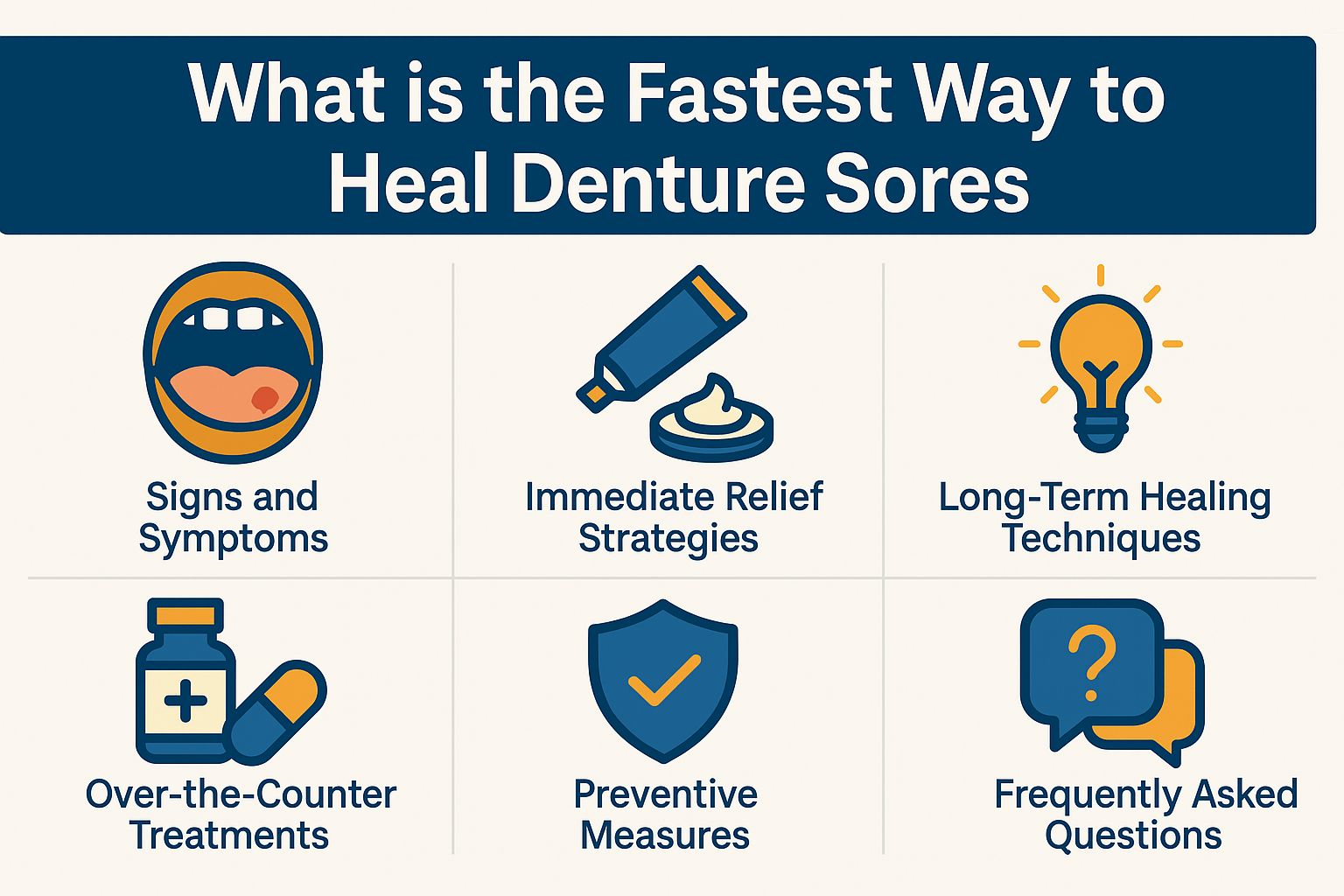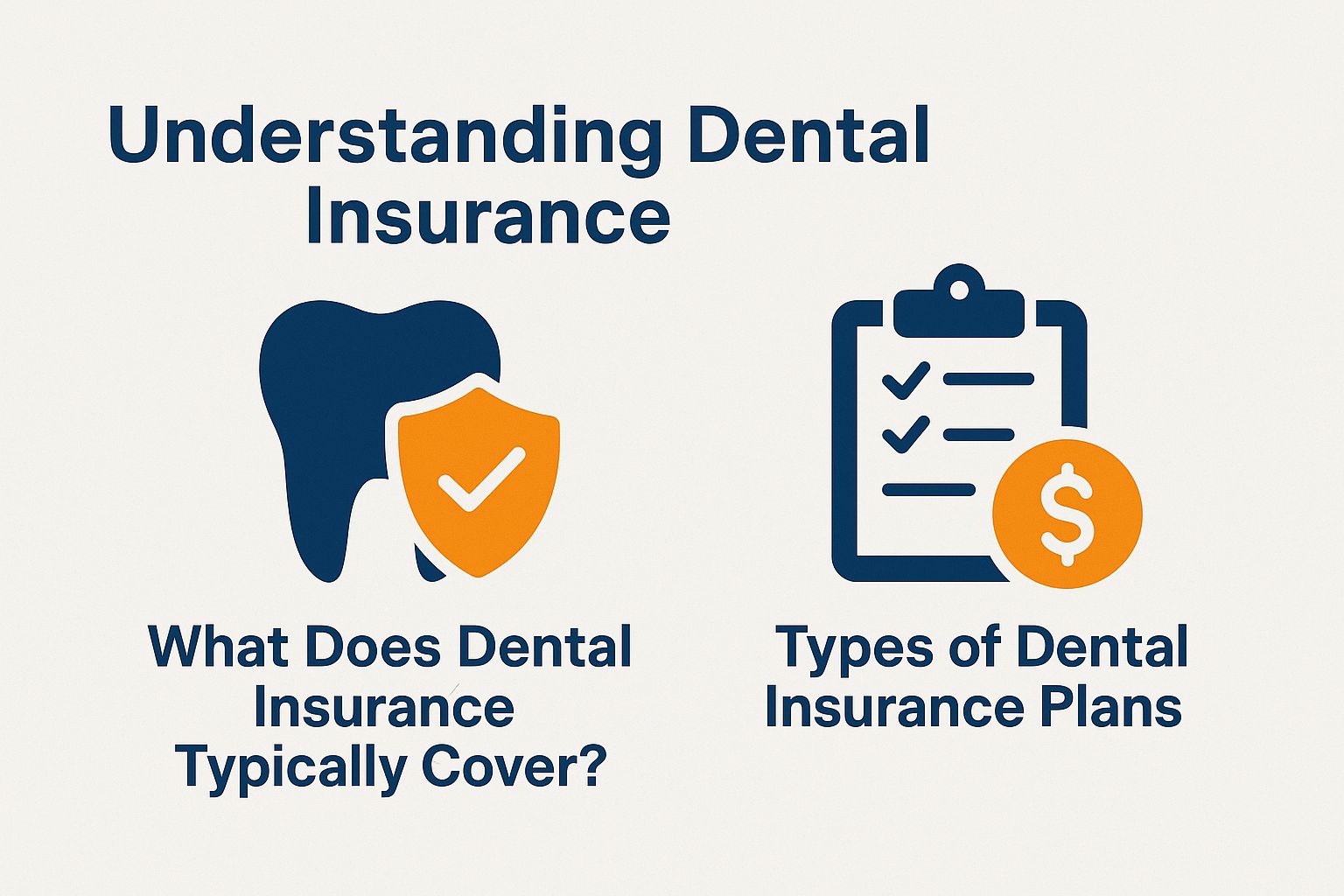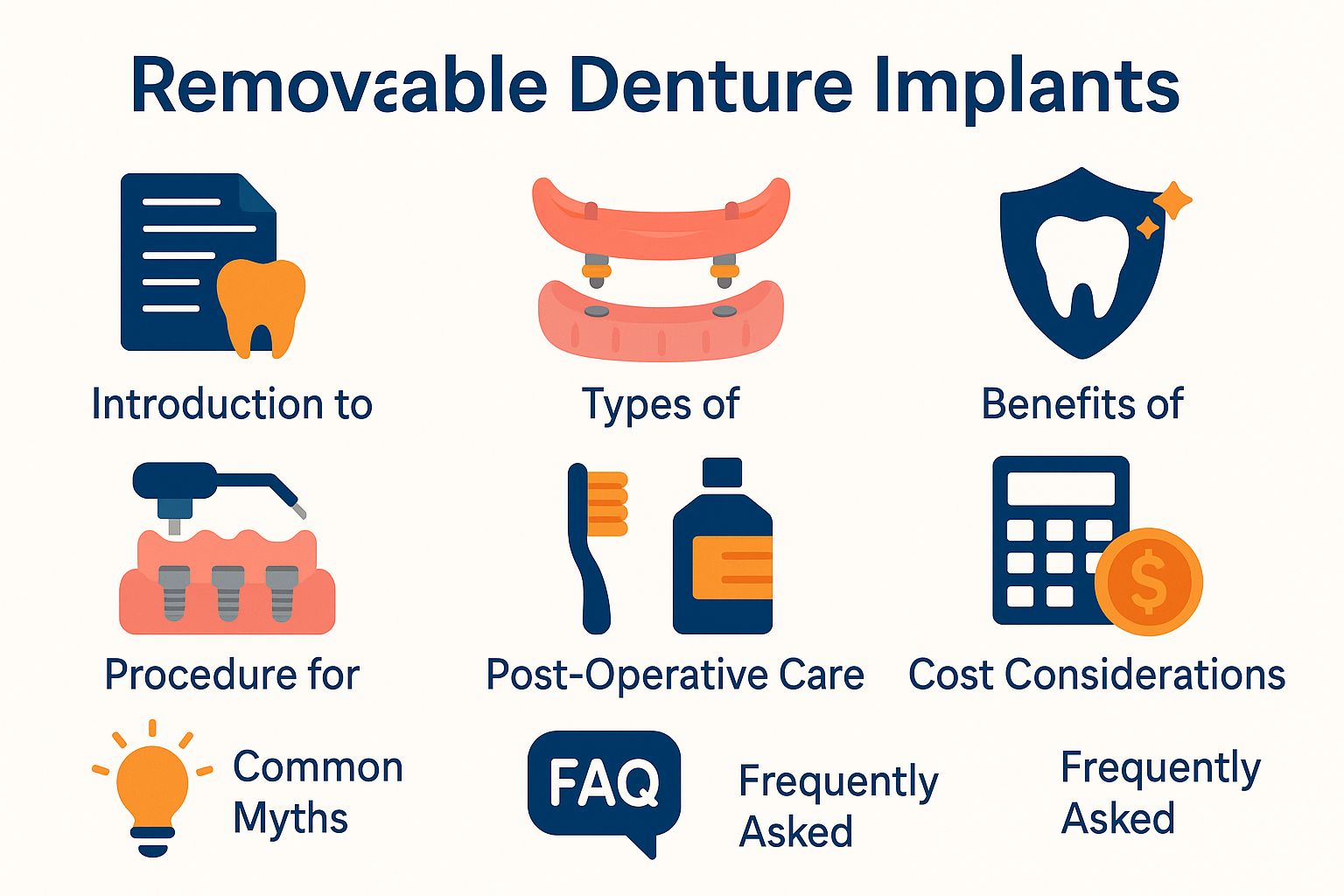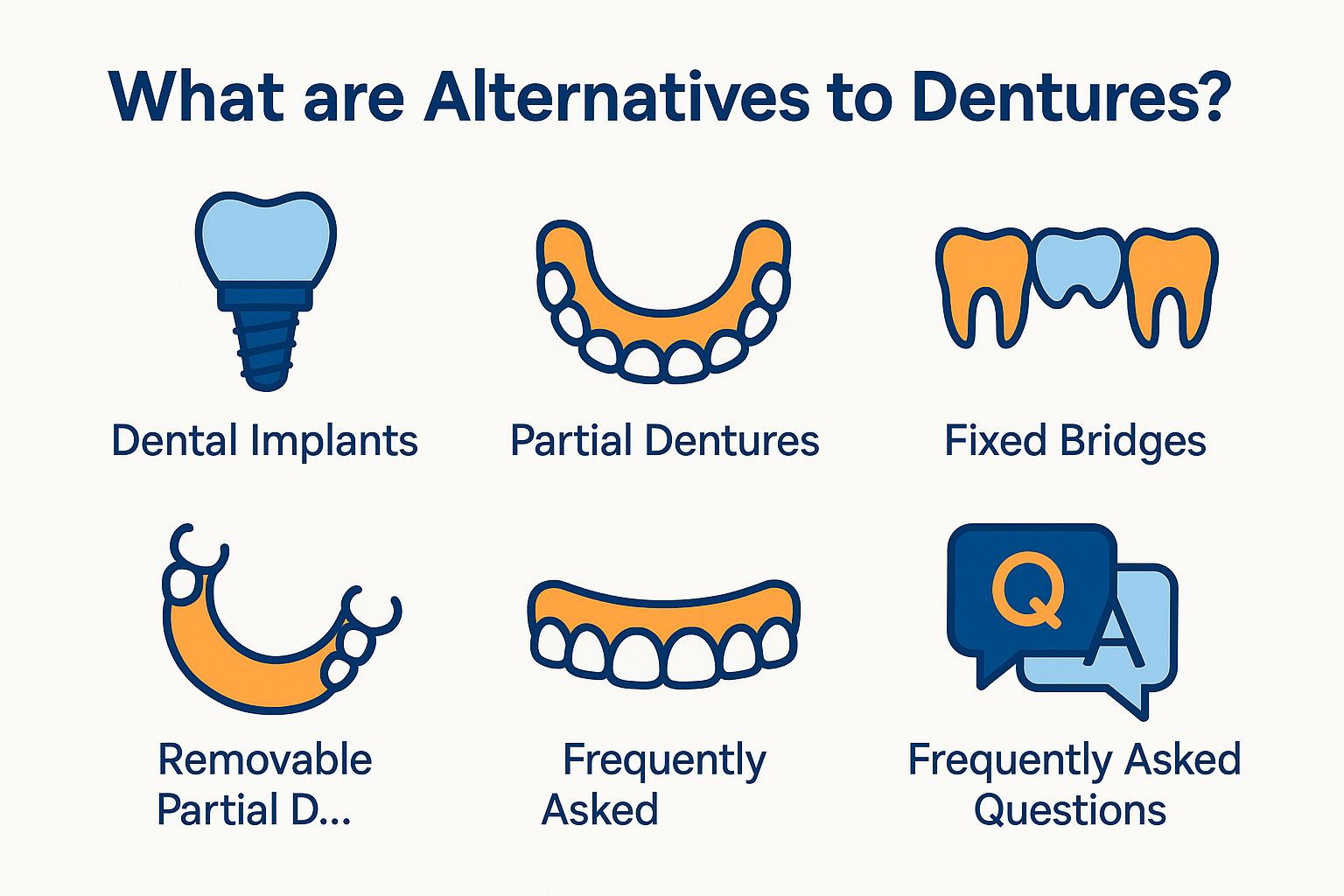
Missing teeth can significantly impact your oral health and self-confidence. Many consider dentures or removable dentures as a solution. Alternatives like dental implants, implant-supported dentures, and overdentures offer durable and aesthetically pleasing options. Dr. Liggett at Northside Dental Co and the experts at Union Dental Health highlight various teeth replacement methods, including dental bridges and full dentures, that can enhance your quality of life. In this article, we’ll explore these alternatives, their benefits, and what you need to know to make an informed choice.
Understanding the Need for Alternatives
Exploring dental procedures and the role of dental professionals can guide you to the best oral appliances for your specific needs.
With over 120 million Americans experiencing the loss of at least one tooth, it is imperative to recognize the importance of denture alternatives and removable dental prostheses for the preservation of oral health and personal confidence.
According to the Cleveland Clinic, the absence of teeth can result in significant health concerns, including bite misalignment and an elevated risk of gum disease. Dental professionals strongly advocate for the prompt addressing of tooth loss to mitigate these potential complications.
For example, dental implants provide a dependable tooth replacement option. They mimic the natural function of teeth with artificial roots that integrate with the jawbone.
Other alternatives include bridges and partial dentures, each offering different costs and lifespans.
Consult with a dental professional to select the best option for your needs and budget.
Dental Implants
Discover the benefits of dental implants as a reliable tooth replacement solution. Dental implants provide a dependable tooth replacement option. They mimic the natural function of teeth with artificial roots that integrate with the jawbone.
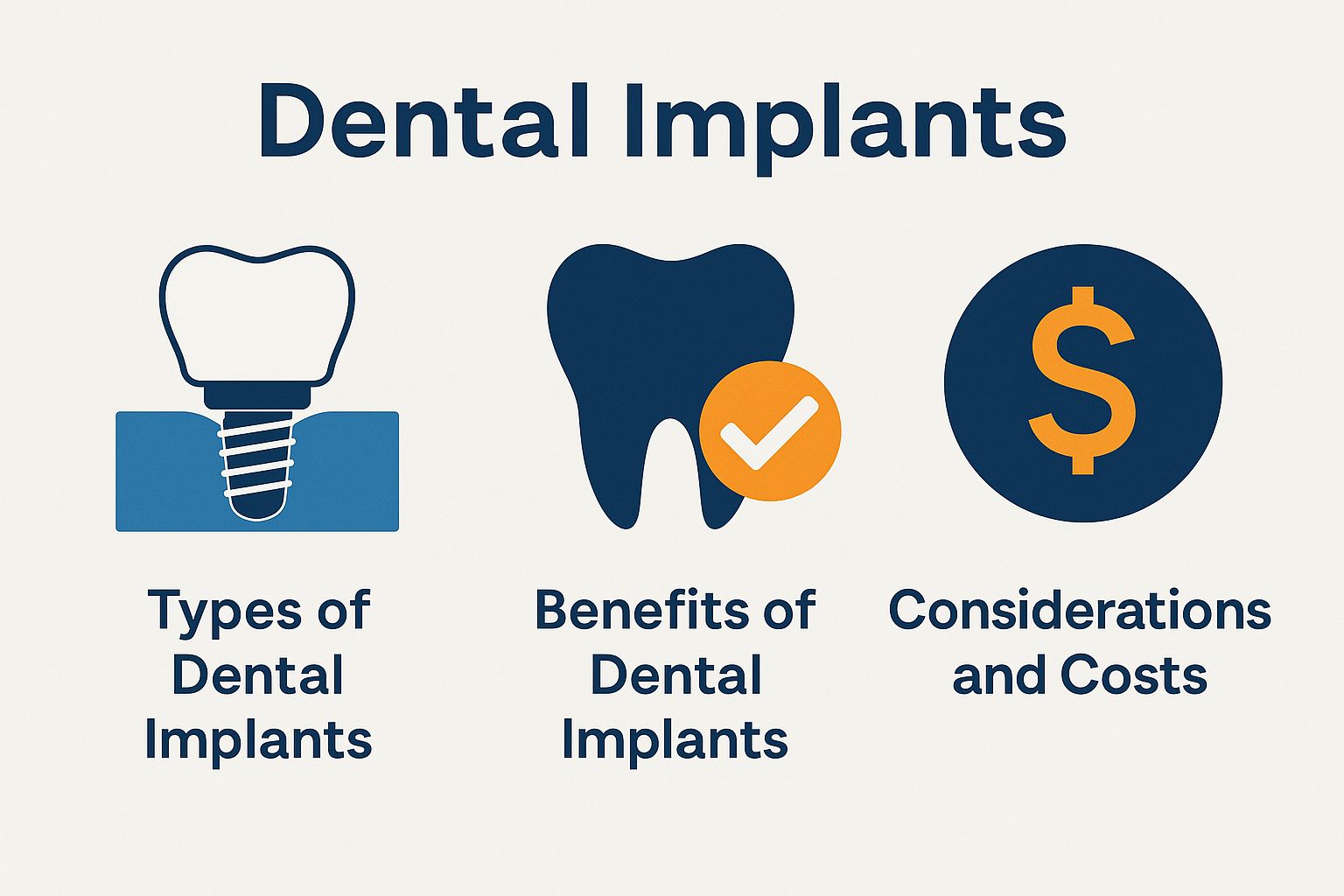
Types of Dental Implants
The three primary types of dental implants are: 1. Endosteal 2. Subperiosteal 3. Zygomatic. Each type addresses specific needs.
Endosteal implants are the most prevalent type, consisting of titanium screws that are surgically placed directly into the jawbone. These implants are suitable for patients who possess sufficient bone density.
Subperiosteal implants are recommended for individuals with limited jawbone availability. This type involves the placement of a metal framework beneath the gum tissue but above the bone, offering a viable solution for those who cannot undergo traditional endosteal implant procedures.
Zygomatic implants, though the least common, provide an alternative for patients experiencing severe bone loss. These implants are anchored into the cheekbone, allowing for dental restoration without the need for extensive bone grafting.
Practices such as Northside Dental Co frequently advocate for endosteal implants due to their high success rates. The cost for these implants typically ranges from $3,000 to $4,500, which contributes to their popularity among patients seeking dental restoration options.
Benefits of Dental Implants
The advantages of dental implants extend beyond mere aesthetics; they significantly enhance oral health by preventing bone loss and improving overall quality of life.
Dental implants serve to stimulate the jawbone, thereby helping to maintain its density and strength, which can avert further oral health complications. Research indicates that endosteal implants possess a 98% success rate, effectively restoring functionality for patients.
Many individuals who have undergone this procedure report increased confidence and comfort, with testimonials emphasizing improvements in speech and eating experiences.
In contrast to dentures, dental implants do not shift or necessitate adhesives, making them a more stable long-term solution. They provide individuals with the opportunity to enjoy their preferred foods without concern.
Considerations and Costs
Consider these factors regarding dental implants: 1. Procedure costs: $3,000 to $4,500. 2. Additional expenses: $1,000 to $2,500 for consultations and imaging.
Dentures generally cost between $300 and $2,500. They may require adjustments and replacements over time.
Many dental practices, including Morning Star Dentistry, offer financing options. This helps patients make manageable monthly payments.
Patients should assess their long-term oral health goals and budgets before making a decision.
Partial Dentures
Partial dentures are a minimally invasive solution for restoring smiles. They work well when some natural teeth remain.
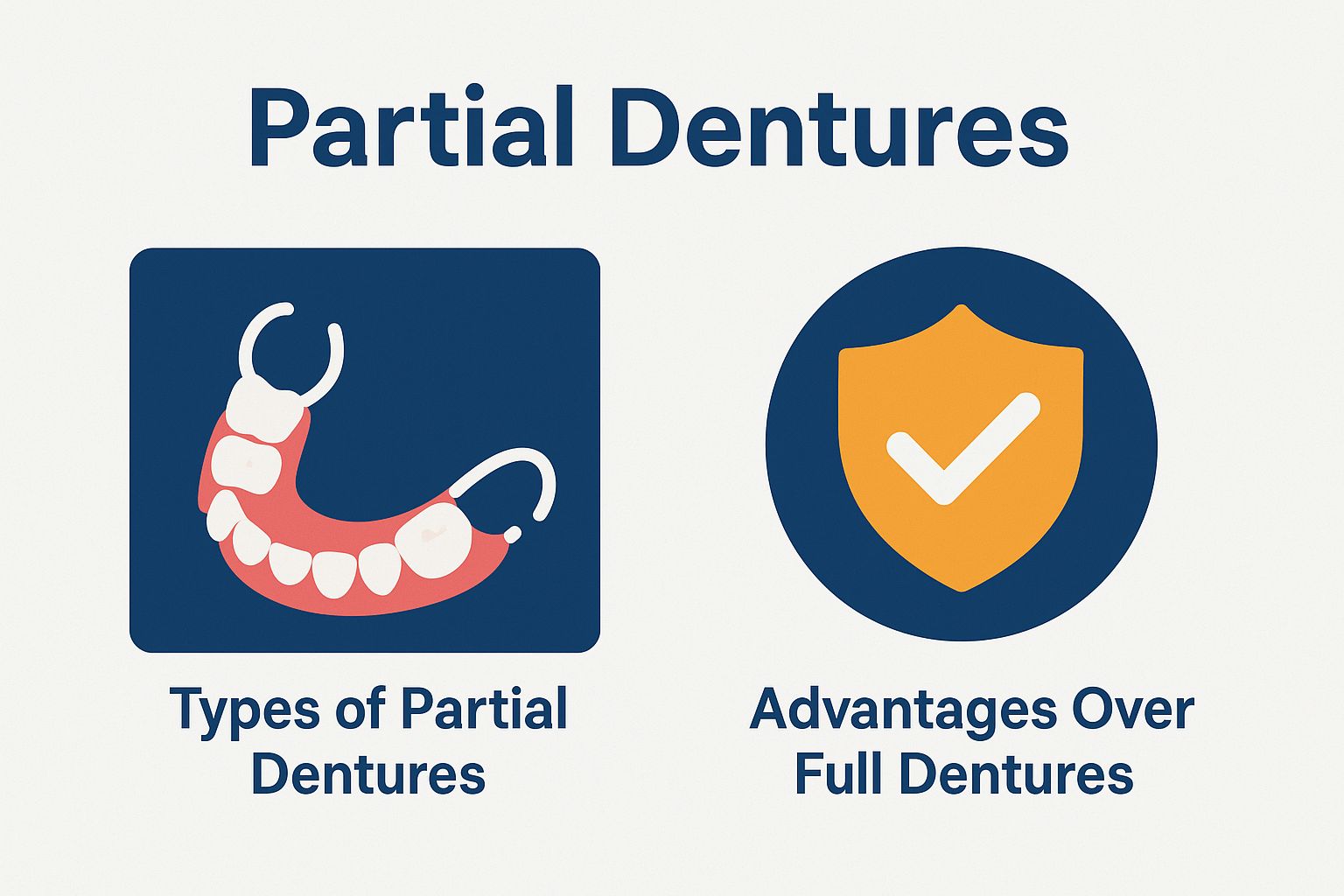
Types of Partial Dentures
There are two main types of partial dentures: fixed and removable. Each type has unique benefits for patients.
Fixed partial dentures, commonly referred to as dental bridges, are permanently affixed to existing teeth and provide enhanced stability and comfort. They are particularly suitable for patients who have lost a tooth but possess healthy adjacent teeth, as they effectively bridge the gap in a seamless manner.
In contrast, removable partial dentures are generally utilized for patients with multiple missing teeth and can be easily removed for cleaning. This option offers flexibility and is advantageous for patients who may experience residual tooth decay.
Consult a dental professional to find the best option for your needs.
Advantages Over Full Dentures
Partial dentures have many advantages over full dentures. They offer better stability and comfort, making them a preferred choice for many patients.
They contribute to improved oral hygiene by facilitating easier access to the gums and remaining teeth, thereby reducing plaque accumulation.
For example, patients utilizing partial dentures can typically maintain normal brushing and flossing practices, while full dentures may necessitate more complex cleaning routines.
Partial dentures also prevent remaining teeth from shifting, preserving your natural bite.
Patients have reported significant improvements in chewing and speaking after switching to partial dentures. This highlights their practicality in daily life.
Fixed Bridges
Fixed bridges provide a permanent solution for tooth loss. They integrate with healthy teeth to restore function and appearance.
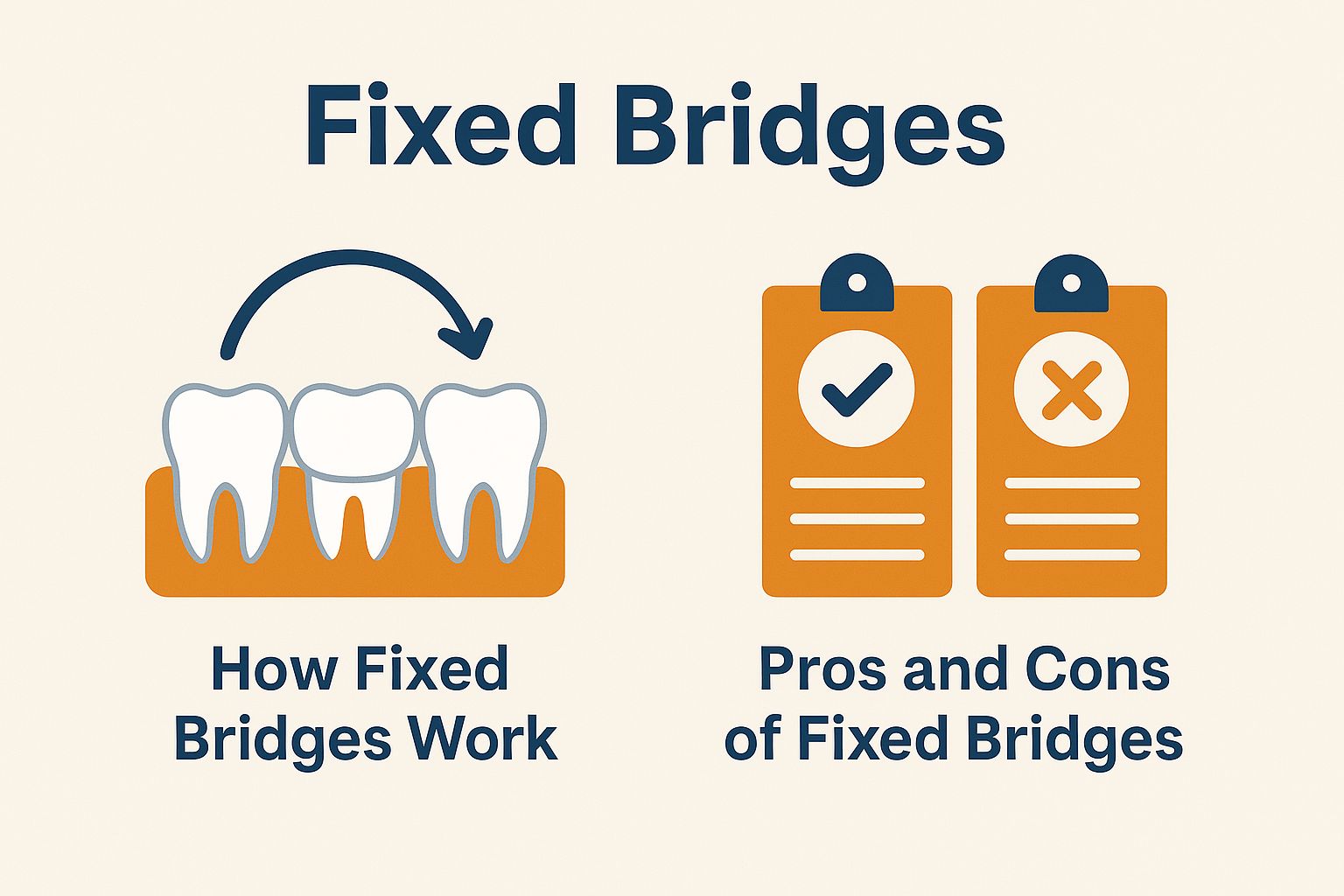
How Fixed Bridges Work
The process starts with a consultation. The dentist evaluates oral health and takes tooth impressions.
Fixed bridges are securely anchored to the existing teeth on either side of the gap, providing a stable and reliable solution for the replacement of missing teeth.
The installation process commences with an initial consultation, during which the dentist evaluates the patient’s oral health and takes impressions of the teeth. Subsequently, the supporting teeth are prepared by reshaping them to accommodate the crowns that will support the bridge.
Following this preparation, temporary bridges may be placed to protect reshaped teeth while the permanent bridge is made. This usually takes about two weeks.
Recovery time varies among patients; however, most individuals can resume their normal activities within a few days, often experiencing only mild discomfort during the initial recovery period.
Pros and Cons of Fixed Bridges
Fixed bridges offer numerous advantages, including enhanced functionality; however, they also entail considerations such as the potential for damage to adjacent teeth. It is imperative to evaluate both the short-term and long-term implications of receiving a fixed bridge.
For instance, while fixed bridges can improve speech and chewing efficiency, patients should also take into account the possibility of requiring root canal treatments on adjacent teeth in the future.
Diagnostic tools such as dental X-rays can assist in assessing bone loss, and consultations with a periodontist may determine whether the gums can adequately support the bridge.
Discuss your dental history and personal needs with your dentist. This ensures the best approach to your dental restoration.
Removable Partial Dentures
Removable partial dentures are specifically designed for patients who have experienced partial tooth loss while retaining some natural teeth. These dentures offer flexibility and are easy to clean.

Features of Removable Partial Dentures
Key features of removable partial dentures include their lightweight design and ease of removal, which facilitate improved oral hygiene and comfort.
These dentures are made from durable materials like acrylic resin or metal, ensuring a good fit and maintaining your facial structure. For example, practices like State College Dental utilize a combination of flexible and rigid components, allowing for a custom fit that enhances stability while ensuring comfort.
Regular adjustments are crucial to accommodate changes in the mouth over time, helping to prevent discomfort and ensuring effective functionality. Working with skilled dental professionals improves the quality and durability of your dentures.
When to Consider Removable Options
Consider removable options, like immediate dentures, if you’ve lost multiple teeth and want a cost-effective solution.
If you’re hesitant about surgery or have significant bone loss, RPDs are a great option. They provide a straightforward application process and often necessitate fewer visits and less time compared to fixed restorations, enhancing comfort stability, making them particularly suitable for individuals who are budget-conscious.
Additionally, RPDs can be easily adjusted in response to changes in dental health, which is a considerable advantage for patients with fluctuating oral conditions and oral health issues. In contrast, while fixed restorations may offer enhanced stability, they require more extensive dental work and a greater commitment from the patient.
Choosing the Right Option for You
When evaluating denture alternatives, consider your needs, budget, and lifestyle with the help of dental professionals from Cleveland Clinic or Morning Star Dentistry.
To help you make an informed choice, consider these alternatives:
- Traditional dentures: These are a cost-effective solution and can give you a confidence smile but may require adjustments over time to ensure proper fit and function.
- Implant-supported dentures: This option offers enhanced stability and comfort, suitable for individuals with adequate jawbone density; however, it entails a higher initial investment. Dr. Liggett at Northside Dental Co can offer valuable insight.
- Removable partial dentures: These are an excellent choice for patients missing only a few teeth, as they allow for straightforward cleaning and maintenance.
Consulting with a dentist can provide valuable insights, helping individuals weigh the advantages and disadvantages of each option in relation to their specific dental conditions and preferences.
Frequently Asked Questions
What are Alternatives to Dentures?
There are several alternatives to traditional dentures, including dental bridges, dental implants, and removable dental partials.
How do dental bridges compare to dentures?
Dental bridges are used to replace one or more missing teeth and are permanently attached to neighboring teeth. They are a more permanent solution than dentures and can improve the appearance and function of your smile.
What about dental implants?
Dental implants are a popular alternative to dentures, as they provide a more natural and permanent solution for missing teeth. Implants are surgically placed into the jawbone and act as a replacement for the root of a missing tooth.
Are there any removable alternatives to dentures?
Yes, removable partial dentures are a good alternative to traditional dentures. These are made with a metal or acrylic framework and attach to remaining natural teeth to fill in gaps left by missing teeth.
Do alternative options require special care?
While dentures require daily cleaning and occasional adjustments, other alternatives such as dental bridges and implants can be cared for like natural teeth with regular brushing, flossing, and maintaining healthy gums.
Which alternative is best for me?
Finding the best alternative to dentures depends on your needs and oral health. Talk to your dentist to find the right solution for you.
